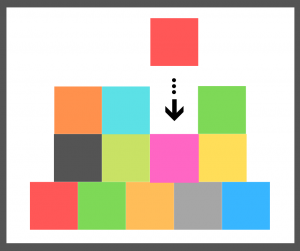
The art of creating order out of chaos – this is my everyday life. How about you? I’m sure I’m not alone in this endeavour. Over the recent Christmas / New Year break I had a few insights into my never-ending battle to keep on top of things and what I discovered was that:
- Life is like a game of Tetris®. Surprising but true!
- We need to acknowledge and give ourselves more credit for the valuable skills we use in managing the everyday messy stuff in life.
The Art of Playing Tetris®
Whilst I’ve never been a fanatic of electronic games, Tetris® has definitely held a degree of fascination for me. There’s something mesmerising about watching the constant trickle of 4-sided blocks floating gently towards the ground, seamlessly slotting into a void, filling the gap with effortless precision to create a smooth, even landscape, so pleasing to the eye and oh so satisfying!
But just when you begin to truly relish in your sense of control and power, your skill and dexterity, the blocks begin to fall with ever increasing unpredictability, speed and frequency. The art of slotting individual pieces in to the already established landscape becomes more and more complex with greater demands on the player. The speed of the game combines with skilled technique, lightning quick reflexes and co-ordination, finely tuned problem-solving and decision-making, until it all becomes too much. The brain overloads, the fingers go on strike, the eyes stop tracking efficiently, and the body slumps over, head held in hands finding comfort in the curled up foetal position as it relinquishes its task to the too hard basket.
Dramatic maybe? Of course! But how much like everyday life is this!

Real Life Tetris®
With the juggling of tasks, people, places and things over Christmas time, I had a moment of realisation that I was actually playing real life Tetris®. Calmly and smoothly orchestrating meals, bushwalks, visits, and baking sprees.
And then another lightbulb went on as I was decluttering. Ding ding! I’m playing real life Tetris® with my cupboards. Shifting A to B and sending C over there so I can bring D back, put half of E here and throw F away.
Then more lightbulb moments as I sat down to do some time planning for the coming year and give special attention to my fruitless never-ending quest to ‘do all the things I love’. Blocking time out for this, deleting that, shifting that commitment to there and allowing space for the unpredictable (there’s never enough space for the unpredictable!)
Shining the Light on the History of Tetris®
With all these lightbulbs illuminating my life, I decided to learn a bit more about Tetris® to see if it could unlock any hidden secrets for me to successfully bring order to chaos and avoid the inevitable overwhelm. Apparently Tetris® was developed by a Russian game designer Alexey Pajitnov in the 1980’s (* thanks Wikipedia). The name comes from ‘tetra’ referring to 4 sides, combined with ‘tennis’ which was the designer’s favourite sport.
The Brain Benefits of Playing Tetris®
Research has suggested that playing Tetris® boosts cognitive functioning such as critical thinking, reasoning, language and processing. Studies have begun to explore the use of playing Tetris® to help people manage traumatic memories, dieting, smoking, drinking, and even treating “lazy eye”.
The Benefits of Playing Real Life Tetris®
So assuming these benefits are dinky di, how many benefits might there be when we scale Tetris® up to my real life version?
When I struggle with juggling ‘all the things’, how might I have a different experience if I focus on the skills I’m using and expanding?
What might be different if I acknowledge that the tedium of everyday life – managing a home, family, community projects and a small business – might actually be honing my skills of precision, co-ordination, mental acuity, recovery, not to mention the aspect of unexpected therapeutic intervention!
What Game Are You Playing?
Is your real life like a game of Tetris® too?
Or perhaps it’s more like another game. I’d love to know! Contact me with your thoughts and reflections.
PS Perhaps it’s no surprise that I love jig saw puzzles too!
Discovering mountain biking as life’s ultimate parallel universe in her middle age, Kathryn Walton shares information and reflections in ‘Daisy Spoke’ that inform, inspire and empower women to a healthy and active lifestyle.






